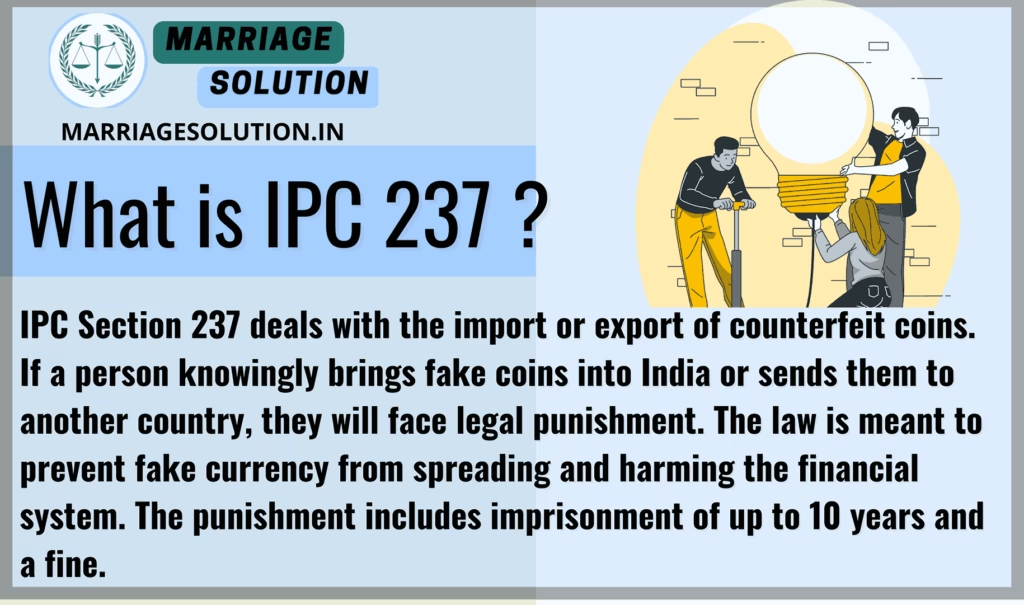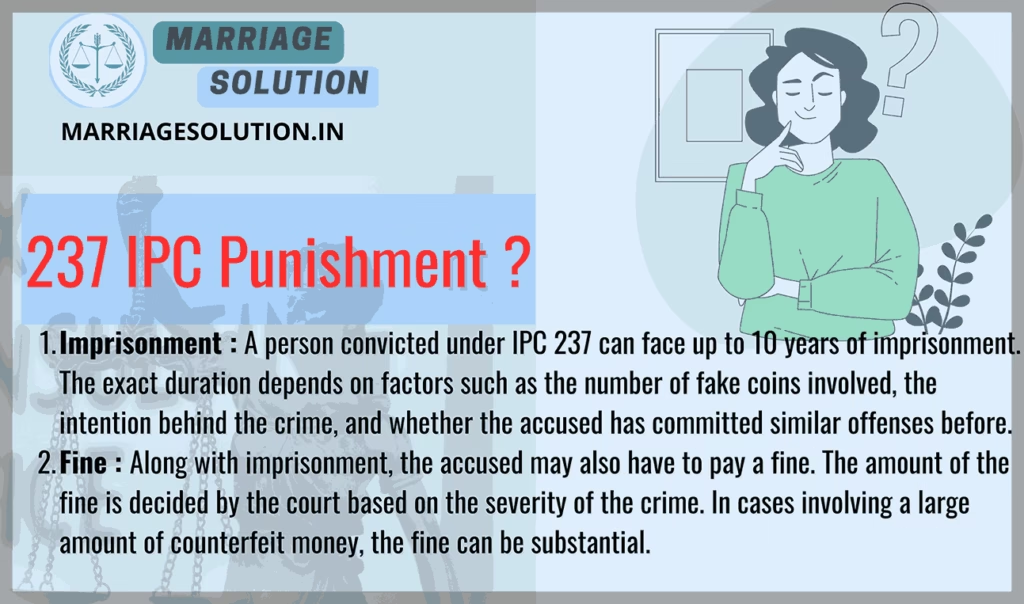Introduction of 237 IPC
IPC Section 237 deals with the illegal import or export of counterfeit coins. This law ensures that no one brings fake coins into India or sends them to another country. Counterfeit coins weaken the financial system, reduce public trust in currency, and cause economic damage. Therefore, strict penalties, including up to 10 years of imprisonment and a fine, are imposed on offenders. This section applies to individuals, organized crime networks, and even businesses involved in illegal currency trade.
- Introduction of 237 IPC
- What is IPC Section 237 ?
- Section 237 IPC in Simple Points
- Section 237 IPC Overview
- 10 Key Points of IPC 237
- 1. Importing or Exporting Counterfeit Coins is a Crime
- 2. Knowing the Coins are Fake is Essential
- 3. Prevents the Spread of Fake Money in the Economy
- 4. Punishment is Severe to Deter Criminals
- 5. Applies to Individuals and Criminal Networks
- 6. Fake Coins Can Be Seized and Destroyed
- 7. Investigations Are Handled by Special Authorities
- 8. Attempting to Import or Export Fake Coins is Also a Crime
- 9. Covers All Types of Counterfeit Coins
- 10. Courts Consider the Scale and Intent of the Crime
- Examples of IPC 237
- Section 237 IPC case laws
- 237 IPC Punishment
- 237 IPC Bailable or non bailable
- Section 237 IPC in short information
- IPC Section 237 FAQs
- If you need support with court proceedings or any other legal matters, don’t hesitate to reach out for assistance.
What is IPC Section 237 ?
IPC Section 237 deals with the import or export of counterfeit coins. If a person knowingly brings fake coins into India or sends them to another country, they will face legal punishment. The law is meant to prevent fake currency from spreading and harming the financial system. The punishment includes imprisonment of up to 10 years and a fine.

Section 237 IPC in Simple Points
1. Crime of Importing or Exporting Fake Coins
IPC 237 punishes anyone who knowingly brings counterfeit coins into India or sends them out of the country. This applies whether the coins are Indian or foreign. The offense is considered serious because fake currency can damage the financial system and create economic instability.
2. Importance of “Knowledge” in the Crime
For a person to be punished under IPC 237, it must be proven that they knew the coins were fake before importing or exporting them. If someone unknowingly carries counterfeit coins across borders, they may not be guilty under this section. However, they must prove their lack of awareness in court.
3. Investigation and Legal Procedure
Cases under IPC 237 are cognizable, meaning police can arrest the accused without prior approval from the court. Investigations are usually handled by customs officials, police, or financial intelligence agencies, and sometimes by the Enforcement Directorate (ED) in serious cases.
4. Punishment for the Offense
If found guilty under IPC 237, the person can face up to 10 years of imprisonment along with a fine. The severity of the punishment depends on factors like the quantity of counterfeit coins, the level of involvement, and previous criminal records.
5. Legal Protection and Bail Conditions
Since IPC 237 is a non-bailable offense, the accused cannot get bail automatically. They must apply for bail in court, and the judge decides whether to grant it based on the seriousness of the case. If the accused is found to be a major player in a counterfeiting network, bail may be denied.
Section 237 IPC Overview
IPC 237 states that any person who imports or exports counterfeit coins, knowing that they are fake, will be punished under Indian law. This section applies to individuals involved in smuggling, distribution, or trading of counterfeit money across national borders.
10 Key Points of IPC 237
1. Importing or Exporting Counterfeit Coins is a Crime
IPC 237 criminalizes both importing fake coins into India and exporting them to other countries. If a person brings fake coins into India from any other nation or sends them out of India, they will be punished under this section. This law helps prevent counterfeit money from spreading internationally.
2. Knowing the Coins are Fake is Essential
To be convicted under IPC 237, the person must knowingly import or export counterfeit coins. If someone unknowingly transports fake coins, they may not be held guilty. However, proving ignorance can be difficult, and a person might still be investigated if found in possession of counterfeit currency.
3. Prevents the Spread of Fake Money in the Economy
Fake coins can cause inflation, reduce public trust in real currency, and harm businesses. IPC 237 aims to stop fake coins from entering or leaving India, ensuring the stability of the financial system. Strict penalties discourage people from engaging in this crime.
4. Punishment is Severe to Deter Criminals
Since importing or exporting counterfeit coins is a serious offense, the punishment includes imprisonment of up to 10 years and a fine. The severity of the punishment depends on factors like the amount of counterfeit money involved, the intent of the accused, and their criminal history.
5. Applies to Individuals and Criminal Networks
IPC 237 does not only apply to individuals; organized crime syndicates, smuggling groups, and illegal businesses can also be prosecuted. If multiple people are involved, everyone connected to the crime can be punished.
6. Fake Coins Can Be Seized and Destroyed
When law enforcement agencies catch a person importing or exporting fake coins, they have the authority to confiscate and destroy them. This ensures that counterfeit money does not re-enter circulation.
7. Investigations Are Handled by Special Authorities
Cases under IPC 237 are usually investigated by police, customs officers, financial intelligence agencies, and, in large cases, the Enforcement Directorate (ED). If international money laundering is suspected, Interpol and other international agencies may also be involved.
8. Attempting to Import or Export Fake Coins is Also a Crime
Even if a person fails to complete the transaction, they can still be punished. If someone is caught while trying to smuggle counterfeit coins, they are guilty under IPC 237, even if the coins were never successfully delivered.
9. Covers All Types of Counterfeit Coins
IPC 237 is not limited to Indian currency. If a person is caught importing fake foreign coins into India or exporting fake Indian coins to another country, they can still be punished. This prevents India from becoming a hub for illegal currency trade.
10. Courts Consider the Scale and Intent of the Crime
When deciding the punishment, courts examine how much counterfeit money was involved, whether the accused was working alone or with a criminal group, and whether they were repeat offenders. A person caught with a small number of fake coins may receive a lighter sentence, while large-scale smugglers face harsher punishment.
Examples of IPC 237
Example 1: A Gang Smuggling Fake Coins
A group of criminals in Nepal prints fake Indian ₹10 coins and sends them to India through secret routes. One of the gang members is caught at the border with bags full of fake coins. He is charged under IPC 237 for importing counterfeit money.
Example 2: An International Currency Smuggler
A businessman secretly ships fake American coins from India to another country. The customs department finds out and seizes the shipment. Since the person knowingly exported counterfeit coins, he is punished under IPC 237.
Section 237 IPC case laws
1. Case: State vs. Ramesh Kumar (2015)
Facts: The police arrested Ramesh Kumar for attempting to smuggle a large amount of counterfeit foreign coins through an airport. The customs officials found hidden coins in his luggage.
Result: The court found him guilty and sentenced him to 7 years of imprisonment along with a fine of ₹1 lakh.
2. Case: Customs Department vs. Anil Mehta (2018)
Facts: Anil Mehta was caught at a border checkpoint with a bag full of counterfeit Indian coins. He claimed he did not know the coins were fake.
Result: The court ruled that Anil had enough experience in currency trading to recognize fake coins. He was sentenced to 5 years in prison and fined ₹50,000.
3. Case: Enforcement Directorate vs. Rajiv Sharma (2021)
Facts: Rajiv Sharma was accused of exporting fake Indian coins to a neighboring country as part of a large counterfeiting network.
Result: Due to the large scale of the operation, the court sentenced him to 10 years of rigorous imprisonment and imposed a heavy fine of ₹5 lakh.
4. Case: State of Maharashtra vs. Salman Sheikh (2013)
Facts: Salman Sheikh was caught with fake currency coins while crossing the Indo-Nepal border. He claimed that he was only a courier and did not manufacture the coins.
Result: The court ruled that even a courier is responsible for his actions. He was sentenced to 6 years in prison and fined ₹2 lakh.
5. Case: Intelligence Bureau vs. Vikram Singh (2017)
Facts: Vikram Singh was arrested for smuggling counterfeit coins into India through a cargo shipment. The fake coins were mixed with genuine ones to avoid detection.
Result: The court found him guilty and imposed a 9-year jail term along with a fine of ₹3 lakh.
237 IPC Punishment
1. Imprisonment
A person convicted under IPC 237 can face up to 10 years of imprisonment. The exact duration depends on factors such as the number of fake coins involved, the intention behind the crime, and whether the accused has committed similar offenses before.
2. Fine
Along with imprisonment, the accused may also have to pay a fine. The amount of the fine is decided by the court based on the severity of the crime. In cases involving a large amount of counterfeit money, the fine can be substantial.

237 IPC Bailable or non bailable
- IPC 237 is a non-bailable offense. This means that bail is not automatically granted, and the accused must approach the court for bail.
- The decision to grant bail depends on the seriousness of the offense and the court’s assessment of whether the accused might flee or continue illegal activities.
Section 237 IPC in short information
| IPC Section | Offense | Punishment | Bailable/Non-Bailable | Cognizable/Non-Cognizable | Trial By |
|---|---|---|---|---|---|
| 237 | Importing or exporting counterfeit coins | Up to 10 years imprisonment + fine | Non-Bailable | Cognizable | Sessions Court |
IPC Section 237 FAQs
What is the difference between IPC 237 and other counterfeiting laws?
IPC 237 specifically deals with the movement of counterfeit coins across borders, while other sections of the IPC focus on making, possessing, or using fake currency within India.
Can a person be punished even if they didn’t succeed in exporting fake coins?
Yes. Attempting to export or import counterfeit coins is also a punishable offense under IPC 237, even if the transaction is not completed.
Who investigates cases under IPC 237?
The police, customs officers, and financial intelligence agencies handle investigations under IPC 237. In serious cases, the Enforcement Directorate (ED) may also be involved.
What if someone unknowingly carries counterfeit coins across borders?
If a person unknowingly imports or exports fake coins, they may not be held guilty. However, they must prove their lack of knowledge in court.
What kind of coins are covered under IPC 237?
IPC 237 applies to all types of counterfeit coins, whether they are fake Indian currency coins or foreign coins being imported or exported.
If you need support with court proceedings or any other legal matters, don’t hesitate to reach out for assistance.
Court or any other marriage-related issues, our https://marriagesolution.in/lawyer-help-1/ website may prove helpful. By completing our enquiry form and submitting it online, we can provide customized guidance to navigate through the process.
